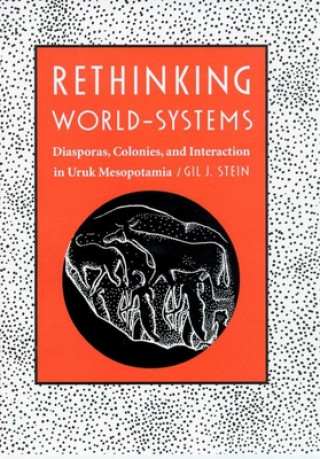
Kód: 06372184
Rethinking World-Systems
Autor Gil J. Stein
The use of world-systems theory to explain the spread of social complexity has become accepted practice by both historians and archaeologists. Gil Stein now offers the first rigorous test of world systems as a model in archaeology ... celý popis
- Jazyk:
 Angličtina
Angličtina - Vazba: Pevná
- Počet stran: 206
Nakladatelství: University of Arizona Press, 1999
- Více informací o knize

1795 Kč
Dostupnost:
50 % šance Máme informaci, že by titul mohl být dostupný. Na základě vaší objednávky se ho pokusíme do 6 týdnů zajistit.
Máme informaci, že by titul mohl být dostupný. Na základě vaší objednávky se ho pokusíme do 6 týdnů zajistit.Prohledáme celý svět
Mohlo by se vám také líbit
-

Dune
216 Kč -

Haunting Adeline
621 Kč -

Berserk Deluxe Volume 2
1092 Kč -

White Nights
89 Kč -

Powerless
268 Kč -

Atomic Habits
330 Kč -

Dune Messiah
228 Kč -

Berserk Deluxe Volume 3
1142 Kč -

One Day
221 Kč -

Berserk Deluxe Volume 1
1115 Kč -

Iron Flame
368 Kč -

Surrounded by Idiots
213 Kč -

Harry Potter and the Prisoner of Azkaban (Minalima Edition)
993 Kč -

Gravity Falls Journal 3
441 Kč -

Heaven Official's Blessing: Tian Guan Ci Fu (Novel) Vol. 1
420 Kč -

The Creative Act
568 Kč -

Dune
276 Kč -

Hunting Adeline
624 Kč -

A Little Life
290 Kč -

Children of Dune
230 Kč -

Heaven Official's Blessing: Tian Guan Ci Fu (Novel) Vol. 2
427 Kč
Darujte tuto knihu ještě dnes
- Objednejte knihu a zvolte Zaslat jako dárek.
- Obratem obdržíte darovací poukaz na knihu, který můžete ihned předat obdarovanému.
- Knihu zašleme na adresu obdarovaného, o nic se nestaráte.
Informovat o naskladnění knihy
Zadejte do formuláře e-mailovou adresu a jakmile knihu naskladníme, zašleme vám o tom zprávu. Pohlídáme vše za vás.
Více informací o knize Rethinking World-Systems
Nákupem získáte 180 bodů
 Anotace knihy
Anotace knihy
The use of world-systems theory to explain the spread of social complexity has become accepted practice by both historians and archaeologists. Gil Stein now offers the first rigorous test of world systems as a model in archaeology, arguing that the application of world-systems theory to noncapitalist, pre-fifteenth-century societies distorts our understanding of developmental change by overemphasizing the role of external over internal dynamics.In this new study, Stein proposes two complementary theoretical frameworks for the study of interregional interaction: a "distance-parity" model, which views world-systems as simply one factor in a broader range of intersocietal relations, and a "trade-diaspora" model, which explains variation in exchange systems from the perspective of participant groups. He tests his models against the archaeological record of Mesopotamian expansion into the Anatolian highlands during the fourth millennium B.C.Whereas some scholars have considered this "Uruk expansion" to be one of the earliest documented world-systems, Stein uses data from the site of Hacinebi in southeastern Turkey to support his alternate perspective. Comparing economic data from pre- and postcontact phases, Stein shows that the Mesopotamians did not dominate the people of this distant periphery.Such evidence, argues Stein, shows that we must look more closely at the local cultures of peripheries to develop realistic cross-cultural models of variation in colonialism, exchange, and secondary state formation in ancient societies. By demonstrating that a multitude of factors affect the nature and consequences of intersocietal contacts, his book advocates a much-needed balance betweenrecognizing that no society can be understood in complete isolation from its neighbors and assuming the primacy of outside contact in a society's development.
 Parametry knihy
Parametry knihy
Zařazení knihy Knihy v angličtině Society & social sciences Sociology & anthropology Anthropology
1795 Kč
- Plný název: Rethinking World-Systems
- Podnázev: Diasporas, Colonies, and Interaction in Uruk Mesopotamia
- Autor: Gil J. Stein
- Jazyk:
 Angličtina
Angličtina - Vazba: Pevná
- Počet stran: 206
- EAN: 9780816520091
- ISBN: 9780816520091
- ID: 06372184
- Nakladatelství: University of Arizona Press
- Hmotnost: 500 g
- Rozměry: 160 × 235 × 24 mm
- Datum vydání: 15. September 1999
Osobní odběr Praha, Brno a 12903 dalších
Copyright ©2008-24 nejlevnejsi-knihy.cz Všechna práva vyhrazenaSoukromíCookies


 Vrácení do měsíce
Vrácení do měsíce 571 999 099 (8-15.30h)
571 999 099 (8-15.30h)